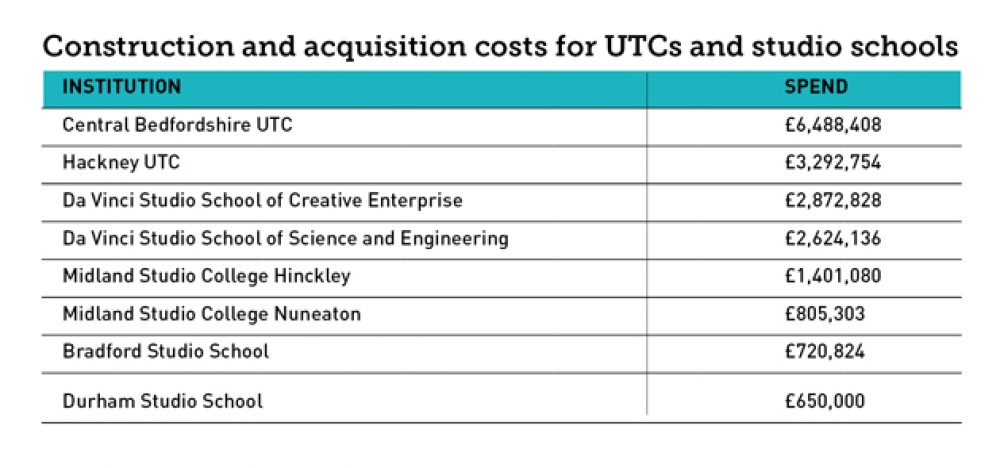The government spent at least £19 million opening university technical colleges and studio schools that closed within four years, new figures reveal.
Updated capital spending data shows that £18,855,333 was spent on construction and land acquisition for two university technical colleges (UTCs) and six studio schools that have since either closed or will close this summer.
Last week Central Bedfordshire UTC, which cost almost £6.5 million to set up, announced it would become the third of the 14 to 19 vocational institutions to close after struggling with recruitment. An investigation by Schools Week’s sister paper FE Week in February revealed the UTC was operating at just 16.8 per cent of its capacity, with 101 pupils on roll and 600 spaces available.
Although the government’s data shows almost £19 million was spent on the doomed projects, the true total is likely to be far greater as the figures do not include every closure.
Fourteen studio schools have been axed, but only six are in the data.
Spending information for Black Country UTC, which had a £9.5 million capital budget when it was set up in 2011 and just 160 pupils out of a possible 480 when it closed last year, is also missing.
The government declined to say why the figures of selected schools were hidden but said the information would be released
in the future.
Almost £3.3 million was spent establishing Hackney UTC, according to the figures. Low pupil numbers forced its closure last summer.
More than £2.2 million was spent on the two Midland Studio Colleges in Hinckley and Nuneaton, which announced in December they would close this year. Almost £5.5 million was shelled out to set up Da Vinci Studio School of Science and Engineering in Stevenage and the Da Vinci Studio School of Creative Enterprise in Letchworth, which will both close in the summer.
However, UTCs will get a new source of financial support. Skills minister Nick Boles wrote to the chairs and principals of UTCs on March 3 to inform them of the “new centrally funded package of educational and financial support”, which will be accessible to UTCs in their early years.
It will be available to those that have not yet been judged good or outstanding by Ofsted, but not to those that are subject to intervention, and will form part of a package of support for UTCs, including mentors for principals, support for governing boards through a national leader of governance (or equivalent) and enhanced education adviser visits in term two for all new UTCs.
The Department for Education was unable to confirm how much this new funding would be worth per UTC or per year in total.
Russell Hobby, general secretary of the National Association of Head Teachers, said: “The volume of spending on failed UTCs is an unaffordable luxury when other schools are struggling to make ends meet. We need a more rigorous process for evaluation, approval and project management.”
Capital spending outlined in the documents totalled £181.6 million for the 20 UTCs included and about £50 million for the 27 studio schools.







Your thoughts